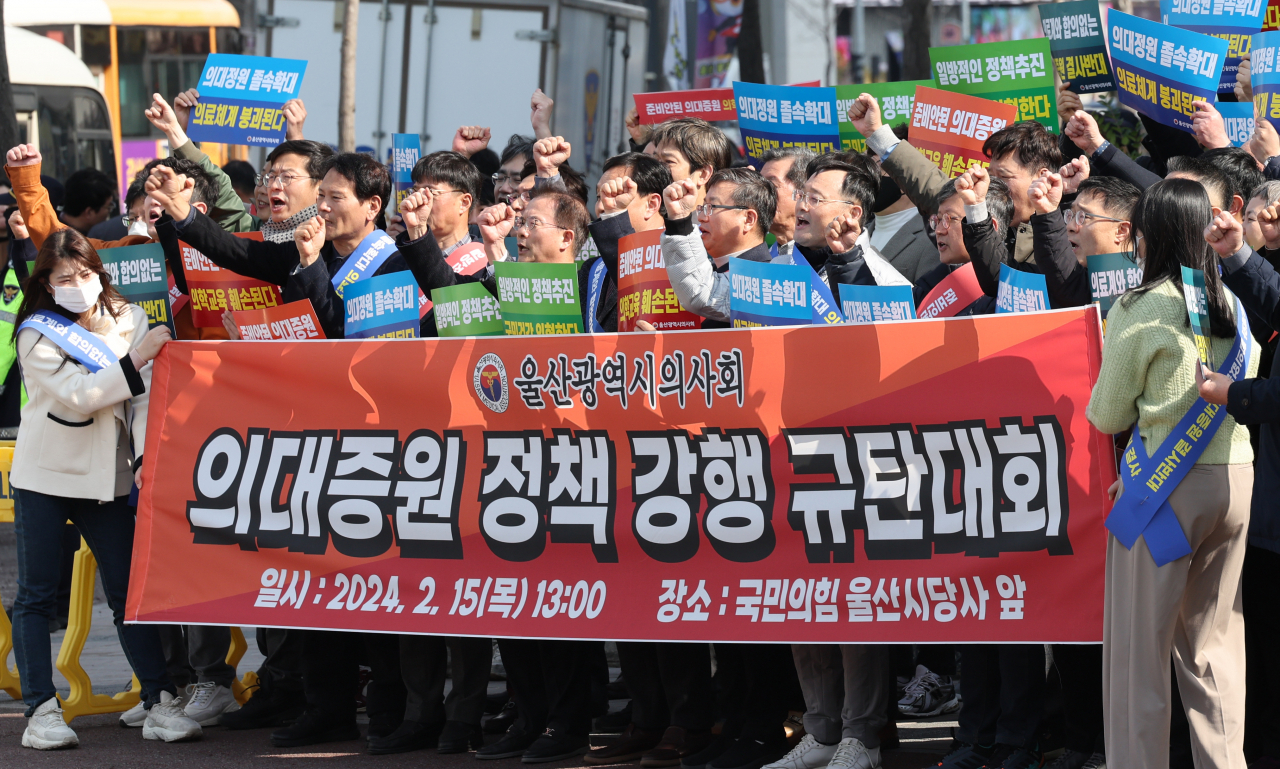Govt. says nationwide doctors' strike unlikely despite growing grievances
By YonhapPublished : Feb. 15, 2024 - 22:14

A nationwide strike by doctors is unlikely to be realized, the health ministry said Thursday, though trainee doctors and medical school students have moved to take collective action against medical school enrollment quota hikes.
Doctors have warned of a massive strike and other responses in opposition to the government's decision announced last week to add 2,000 to the country's medical school enrollment quota next year, marking a sharp rise from the current 3,058 seats.
"The possibility of a massive strike (by doctors) appears to be slim. The government will never allow a situation where the life and health of the people come under threat," Second Vice Health Minister Park Min-soo said during a briefing on the matter.
The government will have extensive consultations with the medical circle, but it will never modify the scale and timing of the plan to raise the quota, Park said, reaffirming its stance to sternly deal with any collective action by doctors.
As some trainee doctors have reportedly moved toward a collective submission of letters of resignation, the government vowed to push for measures meant to improve their working conditions.
No trainee doctors have submitted a letter of resignation, Park added.
In a bid to block the potential strike, the health ministry ordered training hospitals to reject such resignation letters from residents.
Unless residents step down legally as doctors, they must return to work if the government issues an administrative order because doctors are classified as essential workers.
Earlier in the day, Park told MBC radio that the government will fully expand telemedicine services and mobilize assistant nurses if a major association of trainee doctors pushes ahead with a nationwide strike.
The government also planned to use military and public hospitals to respond to the need for emergency medical services.
Although the government says the hike in the medical enrollment quota is needed to address a shortage of doctors in rural areas and essential medical fields, doctors have claimed that the government has not had full consultations on the matter and the decision would rather compromise the quality of medical education and services.
On Thursday, hundreds of doctors affiliated with the Korean Medical Association (KMA), a major lobbying group of doctors, held rallies across the country, calling on the government to scrap the quota increase plan.
In Gangwon Province, some 120 doctors held a protest and criticized the government for "making a makeshift decision that aims to woo voters ahead of the April general elections."
Doctors in Ulsan, Daejeon and several other regions also voiced opposition to the government's plan, saying that the shortage of medical staff in essential medical fields is not related to the number of doctors but because of concerns about criminal punishment and ultra-low medical fees.
More of such protests were planned nationwide later in the day, including one in Seoul and the southern island of Jeju.
The KMA said it will hold a meeting involving delegates of its subgroups in 16 cities and provinces Saturday to discuss what to do next.
In another sign of simmering tension, fourth-year students of the college of medicine at Hallym University in the eastern city of Chuncheon unanimously agreed to take a leave of absence for one year in an effort to prevent the government's "medical reform for the worse."
A major association of medical schools will also carry out a survey on whether to join the move and take a one-year leave of absence, and will make a decision "within a few days."
Members of the group, mostly students of 40 medical schools nationwide, have discussed what to do in response to the government's decision.
Park Dan, the head of the Korea Intern Resident Association, meanwhile, said earlier in the day that he will step down next week as a doctor and the association's head to protest against the planned hike.
"Over the past decade, the proportion of doctors in their 20s has halved, while that for doctors aged 65 and older has more than doubled," Park said. "We cannot meet future needs without raising the number by 2,000."
Later on Thursday, Prime Minister Han Duck-soo called for doctors to refrain from taking collective action.
"The government is not asking for an unjustifiable sacrifice of medical experts. The quota increase is a decision for the future of the people," Han said in a social media post.
"People are already suffering more than just inconvenience due to the shortage of doctors. Raising the quota is the first step of the medical system reform of the Yoon Suk Yeol administration to address such challenges," he added.
Han said the government is open to discussions, noting that it is waiting for a "rational" decision by the medical sector.
(END)



















![[Today’s K-pop] Treasure to publish magazine for debut anniversary](http://res.heraldm.com/phpwas/restmb_idxmake.php?idx=642&simg=/content/image/2024/07/26/20240726050551_0.jpg&u=)